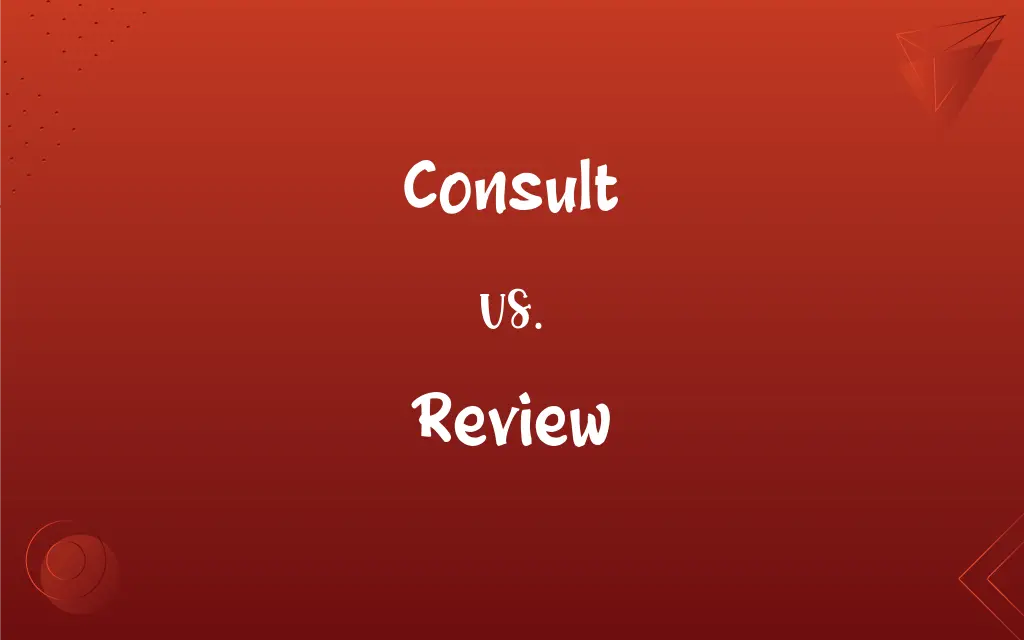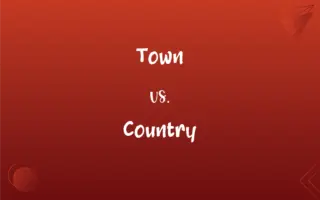Consult vs. Review: What's the Difference?
Edited by Aimie Carlson || By Harlon Moss || Updated on November 7, 2023
Consulting involves seeking advice or expertise, while reviewing is examining or assessing something.

Key Differences
To consult is to seek advice or information from someone with expertise in a particular area. It implies an active process of seeking guidance or knowledge. On the other hand, to review is to examine or assess something with the possibility of instituting change if necessary. It is often a more reflective and evaluative process, looking back on information or activities.
When you consult, you often interact with a person—a consultant or expert—to gain knowledge or solve a specific problem. In contrast, when you review, you might be dealing with documents, events, or products to evaluate quality or performance. Consultation typically involves a dialogue, whereas a review might be conducted individually.
The intention to consult is usually to obtain advice before taking action or to ensure the correctness of a procedure. In contrast, the purpose of a review could be to reflect on something that has already occurred or to assess something's current state, often leading to a judgement or evaluation.
Consultation is generally forward-looking; for instance, you consult a lawyer before entering a contract to avoid future legal issues. Review, however, is typically backward-looking; you might review a contract after its completion to assess its outcomes or compliance.
When you consult, the outcome is usually the acquisition of new insights or advice that can influence future decisions. When you review something, the outcome is often a set of findings or conclusions drawn from the assessment, which can inform changes or improvements.
ADVERTISEMENT
Comparison Chart
Purpose
To seek advice or information.
To evaluate or assess something.
Interaction
Often involves a direct dialogue.
Can be done individually.
Timing
Usually before action is taken.
Often after an action or event.
Outcome
Gaining insights or solutions.
Forming evaluations or judgments.
Focus
Forward-looking (preventative).
Backward-looking (reflective).
ADVERTISEMENT
Consult and Review Definitions
Consult
To refer to a source of information.
He consulted the manual to understand how to operate the machine.
Review
To write a critical assessment of something, often a publication.
He wrote a review of the new novel for the local newspaper.
Consult
To seek advice or information.
She consulted a financial advisor before investing her savings.
Review
To study or look over material again.
She reviewed her notes before the final exam.
Consult
To consider or take into account.
The committee will consult your views before making a decision.
Review
To examine or assess something.
The teacher reviewed the students' assignments over the weekend.
Consult
To meet with someone to discuss or plan.
The board members will consult among themselves to choose the next CEO.
Review
To reconsider or re-examine something.
The board will review the policy in light of recent events.
Consult
To seek permission or approval from someone.
They had to consult the city council before building the new park.
Review
To undergo a formal assessment or examination of a situation.
The company's procedures were under review after the audit.
Consult
To seek advice or information of
Consult an attorney.
Review
To look over, study, or examine again
Reviewed last week's lesson.
Consult
To refer to
Consulted the restaurant's website for directions.
Review
To consider retrospectively; look back on
Reviewed the day's events.
Consult
To take into account; consider
Consult one's checkbook before making a major purchase.
FAQs
What does it mean to consult?
To consult means to seek advice or information from someone, typically an expert or professional.
Who typically provides a consultation?
A consultation is usually provided by someone with expertise in a particular field.
What does it mean to review?
To review means to examine or assess something with the possibility of instituting change if necessary.
Is review always formal?
No, reviews can be formal or informal, such as reviewing notes or a formal performance review.
Can consult be used in a non-professional context?
Yes, you can consult friends or family for advice on personal matters.
Is a review a paid service?
Reviews can be a paid service, especially in professional settings, but many reviews, like peer reviews, are unpaid.
Is a consultation always one-on-one?
Not necessarily, consultations can also occur in groups, like a board consulting with a CEO.
Who conducts a review?
A review can be conducted by anyone charged with the task of evaluation, such as a critic, an auditor, or a supervisor.
Do you need to pay for a consultation?
Professional consultations often require payment, but not always.
What is the outcome of a consultation?
The outcome of a consultation is typically advice or a plan of action.
Can you review a person?
Yes, in the context of performance evaluations at workplaces.
Can review mean to revisit?
Yes, review can mean to look over something again, such as reviewing material before a test.
How formal is a consultation?
Consultations range in formality, from casual advice to formal professional services.
What is the outcome of a review?
The outcome of a review can be an assessment, a recommendation, or a decision.
How detailed is a review?
Reviews can vary from brief summaries to comprehensive evaluations.
What kind of feedback can you expect from a consultation?
Feedback from a consultation is usually advice tailored to your specific situation or question.
Can you consult a document?
Yes, consulting a document means to refer to it for information.
Is a review always critical?
Not always, reviews can be positive, negative, or simply evaluative.
Can consult be synonymous with consider?
In some contexts, yes, such as when pondering a decision.
What kind of feedback can you expect from a review?
Feedback from a review can be a critique, a summary of findings, or suggestions for improvement.
About Author
Written by
Harlon MossHarlon is a seasoned quality moderator and accomplished content writer for Difference Wiki. An alumnus of the prestigious University of California, he earned his degree in Computer Science. Leveraging his academic background, Harlon brings a meticulous and informed perspective to his work, ensuring content accuracy and excellence.
Edited by
Aimie CarlsonAimie Carlson, holding a master's degree in English literature, is a fervent English language enthusiast. She lends her writing talents to Difference Wiki, a prominent website that specializes in comparisons, offering readers insightful analyses that both captivate and inform.































































